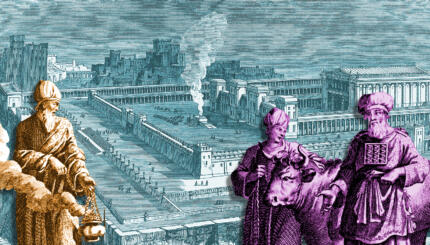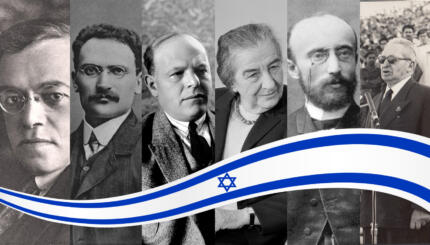It’s Israel week on the Rabbis Without Borders blog. My colleagues Ben Greenberg and Alana Suskin discussed debates among university Hillel organizations about inviting anti-Israel speakers. Just before that, our blog featured the words of a young Canadian in Israel re-thinking his own views.
Of course, we don’t have to be registered university students to explore multiple perspectives and begin a dialogue that leads to deep rethinking. We can begin with the simplest of tools, actually: a traditional Jewish text and a commitment to asking questions.
The
Siddur
includes many prayers that refer to the land of Israel; here I will highlight just one. This short paragraph is found, in slightly different forms, in the prayer books of every Jewish movement, towards the end of every
Amidah
prayer, whether weekday, Shabbat, or holiday. The theme of the paragraph, worshiping God who dwells in Zion, was set by the year 200 C.E.; the precise wording has changed along with Jewish circumstances and philosophies. Below are two different modern versions, in English translation.
Accept the prayer of Your people Israel as lovingly as it is offered. Restore worship to Your sanctuary. May the worship of Your people Israel always be acceptable to You. May we witness Your merciful return to Zion. Praised are You, Lord who restores his Presence to Zion (Siddur Sim Shalom, 1985, Conservative movement).
Take pleasure, GRACIOUS ONE, our God, in Israel your people; lovingly accept their fervent prayer. May Israel’s worship always be acceptable to you. And may our eyes behold your homecoming, with merciful intent, to Zion. Blessed are you, THE FAITHFUL ONE, who brings your presence home to Zion (Siddur Kol Haneshamah, 1999, Reconstructionist movement).
The Conservative wording asks that worship be restored to the Temple sanctuary; the Reconstructionist version asks that worship be acceptable wherever it is offered. Modern Judaism teaches that God is everywhere, and thus people can pray everywhere. So is there or is there not something special about worship in Jerusalem?
What is your experience? Have you been moved to pray in unique or passionate ways while visiting Israel? Does thinking about Israel intensify your prayers for peace and justice? Do you believe that putting a written prayer into the Kotel sends it straight to God? One of my relatives insists that the is an idol; how would you respond to him? Do you know where the Holy of Holies is said to have been? Do you agree with the recommendation of Israel’s Chief Rabbinate to avoid the site? Do you know about recent Jewish-Muslim tensions on the Temple Mount? If you were a responsible government official, how might you mediate?
The Conservative version hopes that we may “witness” God’s “merciful return” to Zion (a historic name for Jerusalem); the Reconstructionist one asks that “our eyes may behold” God’s “homecoming, with merciful intent.” Both “witness” and “behold” refer to the same Hebrew word, v’techezena. In Biblical Hebrew, its root chazon, typically refers to a prophetic vision. Does the prayer ask that we literally see the return, or that we gain a clear vision of what a compassionate return would look like?
How would a compassionate return look? Like the vision of Ezekiel, where no foreigners would enter, and only priests of one of Aaron’s many lineages could be certified to serve? Like the vision of Isaiah, where a new line of priests, representing multicultural Judaism, would be created? Or like the vision of Zechariah, where the renewed Temple would host annual interfaith Sukkot services?
Both the Conservative and Reconstructionist versions hope for the return of God’s shechinah, which they translate as “presence.” What sort of shechinah would you like to see return? Shechinah as understood in early rabbinic literature: the presence that originally accompanied the Israelite camp in their 40 years of wilderness wandering, a presence strengthened by correct ritual and ethical behavior, that also accompanied the Jews during exile to Babylonia? Would a return of this presence require that all Jews make
aliyah
and turn their backs on the creative diversity of the diaspora? Would its return depend on Israeli Jews practicing mitzvot, including compassion for the strangers among them? How would such compassion respond to Palestinian proposals for a right of return?
Or would you like to see the return of the Shechinah as described in the mystical work
Zohar
, one of ten cosmic energies that make up the Godhead; specifically, a feminine motherly energy who feeds all creatures, and without whose embrace God is unbalanced? Would the return of this Schechinah include widespread respect for the practice of gender-egalitarian Judaism, even at the Kotel plaza?
Is your head spinning yet, or is it just beginning to clear? Read the text, consider the questions, and click on the links. Recognize the political pointers in the Siddur. Use them to help you clarify your own commitments and actions. Remember that every prayer is also a prayer for understanding.
The Jewish world is full of debates. Get the latest in MyJewishLearning’s weekly blogs newsletter.
An abridged version of this post appears on OnSophiaStreet.



